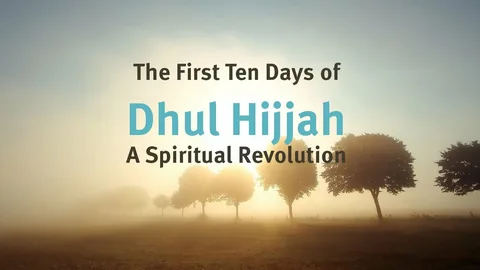Dhul Hijjah, the twelfth month of the Islamic lunar calendar, holds tremendous significance in Islam, marked notably by the Hajj pilgrimage and the Festival of Sacrifice, Eid al-Adha. The first ten days of Dhul Hijjah are particularly sacred, offering Muslims unique opportunities for worship and spiritual growth. in This article on Arabian Tongue website we will explores can we fast the first 10 days of dhul hijjah, its importance, and how to optimally engage in this practice.
What is Fasting?

In Islam, fasting (sawm) is a form of worship that involves abstaining from food, drink, and other physical needs during daylight hours. While Ramadan is the most well-known time for fasting, Islamic teachings encourage fasting at other times throughout the year for additional spiritual benefit.
The Significance of Dhul Hijjah
benefits of Dhul Hijjah‘s first ten days are deemed the best days of the year, according to numerous hadiths. They are a time when good deeds are believed to be most beloved to Allah and have an increased reward. These days lead up to the Day of Arafah and Eid al-Adha, events that commemorate the faith and sacrifice of Prophet Ibrahim and his family.
can we fast the first 10 days of dhul hijjah

Prophet Muhammad (peace be upon him) recommended fasting during these days, particularly emphasizing the Day of Arafah, where fasting expiates the sins of the past and coming year. However, fasting all ten days is not obligatory but highly recommended for those who can manage it.
Day-by-Day Guide to the First 10 Days
Each of the first ten days carries specific virtues and opportunities for worship. Engaging in extra prayers, recitation of the Quran, and acts of charity are highly encouraged during these days.
The Day of Arafah
The 9th day of Dhul Hijjah, known as the Day of Arafah, is the climax of Hajj and holds great esteem in Islam. Fasting on this day is considered to forgive two years of sins.
Rewards of Fasting in Dhul Hijjah
Fasting during the first ten days of Dhul Hijjah is highly esteemed in Islamic tradition due to the significant religious importance of these days. Here’s an overview of the spiritual and religious rewards associated with fasting during this period:
- Great Virtue: The first ten days of Dhul Hijjah are considered some of the most sacred days of the year in Islam. The Prophet Muhammad (peace be upon him) stated, “There are no days during which the righteous action is so pleasing to Allah than these days,” referring to the first ten days of Dhul Hijjah. Fasting during these days, therefore, is a means to seek extra blessings and favor from Allah.
- Day of Arafah: Fasting on the Day of Arafah, which is the ninth day of Dhul Hijjah, is particularly significant. It is believed that fasting on this day expiates the sins of the past year and the coming year. This is based on a hadith where the Prophet Muhammad (peace be upon him) said, “Fasting the Day of Arafah forgives the sins of the past year and the coming year.”
- Drawing Closer to Allah: These days are a time to make an increased effort in all forms of worship, including prayer, charity, and recitation of the Quran. Fasting is one of the deeds believed to bring a person closer to Allah, and it’s especially honored when observed voluntarily such as in Dhul Hijjah.
- Mimicking Hajj Rituals: For those not performing the Hajj, fasting during the first nine days of Dhul Hijjah is a way to spiritually participate in the pilgrimage experience from afar. The Day of Arafah, for instance, is a pivotal part of the Hajj, and fasting on this day aligns the observer with the pilgrims on Mount Arafah in a state of reflection and devotion.
- Increased Spiritual Reflection and Self-Discipline: Fasting helps in self-discipline, self-control, and offers a time of deep spiritual reflection. The act of fasting combined with the sacred nature of these days offers a profound context for renewing one’s faith and practices.
- Opportunity for Renewal and Forgiveness: These ten days are an opportune time for Muslims to seek forgiveness for their sins, make sincere repentance, and perform good deeds. The heightened sense of sacredness and the added emphasis on fasting heighten the sense of spiritual renewal.
How to Prepare for Fasting
Preparing for fasting, whether it’s for spiritual practices like in Dhul Hijjah or for health reasons, involves both mental and physical preparation. Here’s a comprehensive guide to get ready for a fasting period, which can also enhance your focus and dedication—traits that are beneficial in many aspects of life, including academics and professional commitments like those involved in translation or teaching.
- Spiritual/Religious Fast: Clearly define your spiritual or religious intentions. For fasting during Dhul Hijjah, it’s to seek closeness to Allah and to earn His pleasure.
- Other Types of Fasting: Set personal goals, whether it’s for health, detoxification, or discipline.
- Begin adjusting your diet a few days before the fast. Reduce caffeine and sugar intake to mitigate withdrawal symptoms. Incorporate more hydrating foods and decrease salt consumption to prevent excessive thirst during fasting hours.
- Increase your water intake leading up to the fast. Drinking adequate water is crucial to avoid dehydration, especially if you’re in a region or season with high temperatures.
- Suhoor (pre-dawn meal): Choose foods that are rich in complex carbohydrates and fiber to provide sustained energy. Examples include whole grains, beans, and lentils, coupled with proteins like eggs or yogurt.
- Iftar (meal to break the fast): Start with dates and water, following the prophetic tradition, then move to a balanced meal containing vegetables, proteins, and healthy fats to replenish your body.
- Adjust your sleep schedule to ensure you get enough rest. Plan to sleep shortly after Isha prayer and wake up early for Suhoor. This can also help in managing your study or work schedule, particularly if you’re juggling multiple responsibilities or involved in intensive tasks like learning new languages or managing projects.
- Engage in additional spiritual activities such as prayer, meditation, or reading religious texts. This can enhance the spiritual benefits of fasting.
- If you’re fasting for religious reasons during Dhul Hijjah, increase your recitation and understanding of the Quran to connect more deeply with the spirit of the fast.
FAQs
Can I fast if I am traveling during Dhul Hijjah?
Yes, you can fast while traveling if you feel able to do so without hardship.
Are there any specific prayers to recite while fasting?
While there are no specific prayers required, the recitation of the Quran and extra prayers (nafl) are recommended.
What if I miss a day of fasting?
If you miss a day, you can make it up after Eid al-Adha, although it's not required.
How do children participate in Dhul Hijjah?
Children can be encouraged to fast part of the day or engage in extra prayers and good deeds suitable for their age.
Is it necessary to fast all 10 days?
It is not necessary, but fasting as many days as possible is highly recommended.
Conclusion
Fasting during the first ten days of Dhul Hijjah is a profoundly rewarding practice that offers great spiritual benefits. Muslims are encouraged to take advantage of this blessed time by engaging in fasting and other acts of worship.


